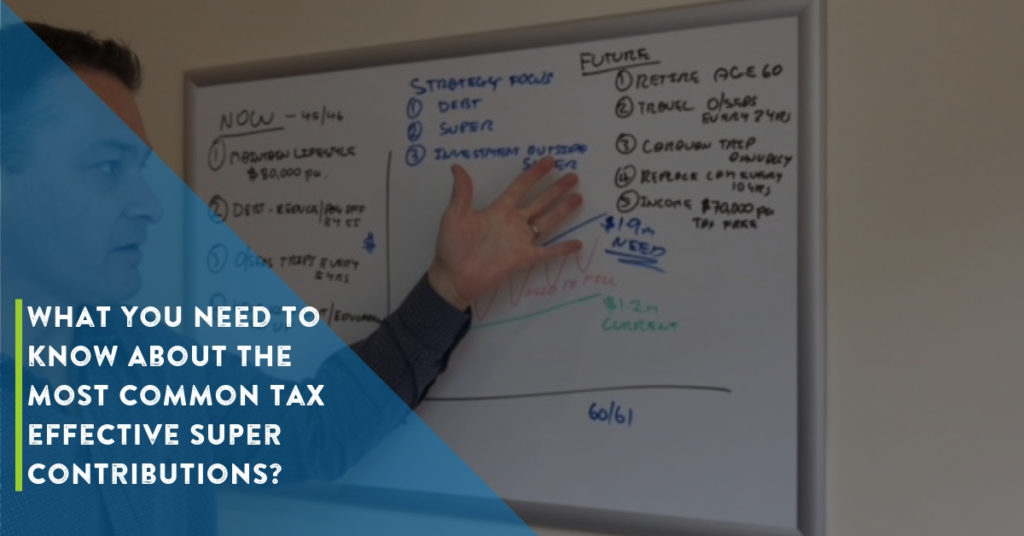
Superannuation Part 2 | What you need to know about the most common tax effective contributions?
Okay. so last week we got a handle on what superannuation is. It’s a tax structure first and foremost and a place to invest second.
If you missed last weeks post you can access it by clicking here>>
So, this week are going to get into the nitty-gritty of the most common tax effective contributions. At the end of this post, you should have a good understanding of the most common superannuation contributions you can make and apply them in your own circumstances.
Employer Contributions:-
Your employer is legally obliged to pay you 9.5% of your income into your super fund each year. It’s worth checking to see that your employer is paying the right amount into your super fund as there have been circumstances where employers have underpaid in the last few years. It’s illegal to pay less than the 9.5%.
If your income is $80,000 pa your employer should be paying $7,600pa into your super fund.
If your income is $120,000 pa your employer should be paying $11,400 pa into your super fund.
Salary Sacrifice Contributions:-
Salary sacrifice contributions are contributions you make or elect (tell your employer) that you would like to contribute to super in lieu of receiving it as income and being paid to you.
Why would you sacrifice some of your salary into your super?
- You’ll struggle to get a better return on your money with minimal risk. Let’s say you are earning $80,000 pa and you decide to contribute an extra $1,000 pa into your super fund via salary sacrifice. If you were to take this $1,000 as income you would pay tax of $325(including Medicare levy), leaving you with $675 in your hands. However, if you contribute this to super via salary sacrifice you would be able to invest $850 (after the 15% contributions tax). You have just made a 26% return on your money prior to any investment return.
If you were on $120,000 pa and you did the same, contribute $1,000 into your super fund via salary sacrifice, instead of receiving $610 in your hands you will have $850 to invest. That’s a return of 39% prior to any investment returns you are able to generate.
See how powerful this can be, add to that the 8th wonder of the world compound interest and you can see why starting early will really turbo-charge your super.
2. It’s going to save you tax. As Australians, we all want to pay the least tax possible, so this is one way you can pay less tax.
3. We are all going to retire at some point in time and the world is changing. No longer are we able to follow in our parent’s footsteps. We are expected to live longer than our parents. Government benefits are harder to gain access too. Whether we like super or not or the fact that we may not be able to see it for some time, we need to stop giving in to apathy and take an interest and start building our own retirement funds so we can retire on our own terms.
What are the limits?
Between your employer contribution and the contribution, you make via salary sacrifice your total contributions are limited to $25,000 pa. This has been reduced for everyone in the 2019 financial year.
What happens if you exceed these limits?
Lucky the penalties are not as harsh as they have been in the past. If you contribute more than the limit, the excess will be included in your income and taxed at your marginal rates. You have the option of withdrawing the excess amount or leaving it in your super fund. If you leave it in your super fund it is included as a non-concessional contribution and we will discuss these next week.
What’s changed?
You no longer have to inform your employer that you want to make a salary sacrifice contribution. Although this is the most common way of making a salary sacrifice contribution you are now able to make a contribution to your super fund any time through the year and claim a tax deduction for it in your tax return. You could not do this previously.
Therefore for some, they will leave it until the end of the financial year to do this. Just make sure when you contribute this to your super fund they are aware you want to claim a tax deduction for it.
So, you haven’t used your limits? Now what?
Starting from 1 July 2018, if you have not used your full limit of $25,000 and your superannuation account is less than $500,000 you will be able to make catchup payments and claim a tax deduction for these contributions. This will be very useful for those with lower super balances later on in their working life where they may have the excess income they can use to contribute to super.
Example: Joe with income of $120,000 pa, super account balance $300,000
Let’s say Joe’s only contributions are his employers 9.5% each year($11,400). The contribution cap is $25,000, leaving $13,600 extra he can contribute.
So, for FY19, FY20, FY21 Joe makes no further contributions above his employer’s contribution. Joe’s super balance is still under $500,000. In FY22, Joe has requested his employer to contribute an extra $40,800 of his income into his super as a salary sacrifice contribution over the year. So instead of the $25,000 limit, he is able to contribute up to a maximum amount of $73,000 including his employer contribution.
This is calculated on a rolling 5-year basis from 1 July 2018.
Particularly useful for those looking at contributing more later when perhaps they have more disposable income after mortgages have been paid down and kids left home.
How much tax do I pay on my contributions?
For most contributions made via your employer contributions, salary sacrifice or personal tax-deductible contributions are taxed at 15%.
Income over $250,000, your contributions are taxed at 30%.
As you can see, if you use the rules to your advantage it can help you build a larger super balance for when you retire and hopefully give you a better chance of living the lifestyle you want in retirement.
Hope that’s been useful.
If you haven’t already downloaded our Start Right Guide to Designed Retirement Lifestyles Guide you can download it by clicking here>>
If you have any questions relating to the above feel free to email me at gdoherty@jigsawprivatewealth.com.au
NEXT STEPS:-
Feel like you want to be in more control of your money? Book a 15 min Fast Track call here>>
I have 5 spots left this month…
We’ll get on the phone for a quick chat and:-
- Have a quick look at the issues you are facing or wanting to address and perhaps a couple you don’t know about.
- Help you diagnose what might be getting in the way.
- Give you clarity about the main actions you should be taking now to get you ahead quicker.
Make it a great Life!
Glenn Doherty – CFP – Founder & Financial Organiser at Jigsaw Private Wealth
Website: jigsawprivatewealth.com.au
Email: gdoherty@jigsawprivatewealth.com.au
Mob: 0401 253 729

